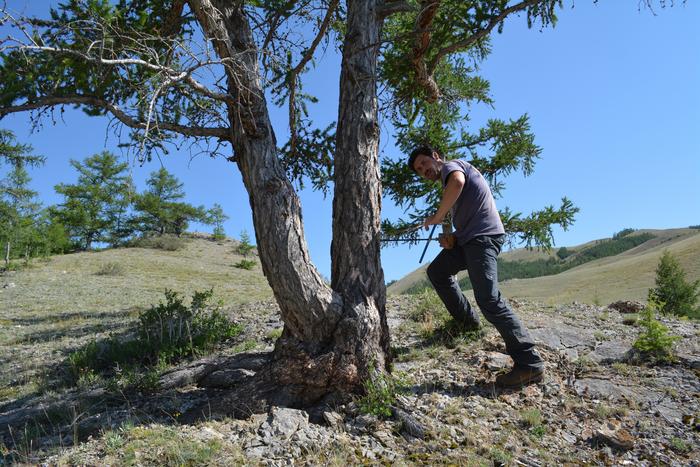Researchers have found that 2023 was the hottest summer in the Northern Hemisphere in the past two thousand years, almost four degrees warmer than the coldest summer during the same period.

Credit: Ulf Büntgen
Researchers have found that 2023 was the hottest summer in the Northern Hemisphere in the past two thousand years, almost four degrees warmer than the coldest summer during the same period.
Although 2023 has been reported as the hottest year on record, the instrumental evidence only reaches back as far as 1850 at best, and most records are limited to certain regions.
Now, by using past climate information from annually resolved tree rings over two millennia, scientists from the University of Cambridge and the Johannes Gutenberg University Mainz have shown how exceptional the summer of 2023 was.
Even allowing for natural climate variations over hundreds of years, 2023 was still the hottest summer since the height of the Roman Empire, exceeding the extremes of natural climate variability by half a degree Celsius.
“When you look at the long sweep of history, you can see just how dramatic recent global warming is,” said co-author Professor Ulf Büntgen, from Cambridge’s Department of Geography. “2023 was an exceptionally hot year, and this trend will continue unless we reduce greenhouse gas emissions dramatically.”
The results, reported in the journal Nature, also demonstrate that in the Northern Hemisphere, the 2015 Paris Agreement to limit warming to 1.5C above pre-industrial levels has already been breached.
Early instrumental temperature records, from 1850-1900, are sparse and inconsistent. The researchers compared early instrumental data with a large-scale tree ring dataset and found the 19th century temperature baseline used to contextualise global warming is several tenths of a degree Celsius colder than previously thought. By re-calibrating this baseline, the researchers calculated that summer 2023 conditions in the Northern Hemisphere were 2.07C warmer than mean summer temperatures between 1850 and 1900.
“Many of the conversations we have around global warming are tied to a baseline temperature from the mid-19th century, but why is this the baseline? What is normal, in the context of a constantly-changing climate, when we’ve only got 150 years of meteorological measurements?” said Büntgen. “Only when we look at climate reconstructions can we better account for natural variability and put recent anthropogenic climate change into context.”
Tree rings can provide that context, since they contain annually-resolved and absolutely-dated information about past summer temperatures. Using tree-ring chronologies allows researchers to look much further back in time without the uncertainty associated with some early instrumental measurements.
The available tree-ring data reveals that most of the cooler periods over the past 2000 years, such as the Little Antique Ice Age in the 6th century and the Little Ice Age in the early 19th century, followed large-sulphur-rich volcanic eruptions. These eruptions spew huge amounts of aerosols into the stratosphere, triggering rapid surface cooling. The coldest summer of the past two thousand years, in 536 CE, followed one such eruption, and was 3.93C colder than the summer of 2023.
Most of the warmer periods covered by the tree ring data can be attributed to the El Niño climate pattern, or El Niño-Southern Oscillation (ENSO). El Niño affects weather worldwide due to weakened trade winds in the Pacific Ocean and often results in warmer summers in the Northern Hemisphere. While El Niño events were first noted by fisherman in the 17th century, they can be observed in the tree ring data much further back in time.
However, over the past 60 years, global warming caused by greenhouse gas emissions are causing El Niño events to become stronger, resulting in hotter summers. The current El Niño event is expected to continue into early summer 2024, making it likely that this summer will break temperature records once again.
“It’s true that the climate is always changing, but the warming in 2023, caused by greenhouse gases, is additionally amplified by El Niño conditions, so we end up with longer and more severe heat waves and extended periods of drought,” said Professor Jan Esper, the lead author of the study from the Johannes Gutenberg University Mainz in Germany. “When you look at the big picture, it shows just how urgent it is that we reduce greenhouse gas emissions immediately.”
The researchers note that while their results are robust for the Northern Hemisphere, it is difficult to obtain global averages for the same period since data is sparse for the Southern Hemisphere. The Southern Hemisphere also responds differently to climate change, since it is far more ocean-covered than the Northern Hemisphere.
The research was supported in part by the European Research Council.
Journal
Nature
Article Title
2023 summer warmth unparalleled over the past 2,000 years
Article Publication Date
14-May-2024



